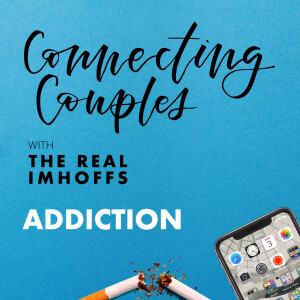Episodes

Wednesday Oct 19, 2022
Connecting Couples in Addiction: Episode 11- The Partner of Addiction
Wednesday Oct 19, 2022
Wednesday Oct 19, 2022
Episode 11: The Partner of Addiction
Show Notes
First 5 minutes:
Intro- Now that your partner has a stretch of sobriety, the partner of the addict has to adjust the tendencies of control and over managing- that were required when the addict was using- but that are now not helpful for the relationship.
Diving in to the other side of addiction, looking at the partner of someone who has had an addiction. The first thing we notice is just how hard the person is working to maintain balance in the home. The partner of the addict often is the one picking up all the slack to make sure everything runs ok AND in all that doesn’t give up on the relationship.
Things like- create activities to keep the kids busy to they don’t feel the lack, continually checking the bank accounts to make sure they have security, over managing schedules and plans to try and mitigate any misses, etc… The reason this is hard is because the partner is doing SOOO much to help that it is completely unfair to imply that their behaviors are now part of the addictive cycle.
Minutes 5-10:
In order to maintain everything, the partner has to manage so much, and can’t rely on the addict, and now that there is a stretch of sobriety and health, you have to release some of the things that you had to take on. Just like the addict has to learn to replace the bad choices with healthy ones, the partner to the addict has to consider replacing some of the controlling tendencies with something else that is healthier for the relationship.
There are some deeper questions worth considering when you are the partner of a person who struggled with addiction. One question to consider is… what about me chose a person who chose addiction. It is easier to blame the addict for the being the problem then to consider how my responses or behaviors might be contributing to the problem.
Minutes 10-15:
We cannot say enough that this is hard to hear, hard to consider, hard to take in, hard to believe. It is good to acknowledge that the partner’s behaviors to keep everything going were needed to keep everything going, but now things have to shift.
Here are some practical action steps that the partner can consider. The first is awareness. Self-awareness and self-care are important for the partner to have regardless of the addict choices. Several series ago we talked about how the wounded or hurt partner needs to be able to distill down their pain, then share it in a way that the partner can respond to.
It’s a hard shift to for the partner to start to see the former addict as a resource versus a liability. The more we can clarify our internal messages the more likely we can get the response we need.
Minutes 15-20:
For these injuries that happened in the height of the unhealthy behavior, both partners have to realize that there was no way to address it in the moment. The partner was only surviving the addict’s choices. Now that they have sobriety and awareness, there is an opportunity to build security where there were gaping wounds and pain. It’s nearly impossible. Because your partner has failed you in your past, you have built rigid systems that have not failed you, and now we’re asking you to consider putting aside the thing that has not failed you, and try to rely on the thing that has failed you. We understand this is unfair and also really difficult.
However, if we continue to behave as though our partner is still unhealthy, even though there has been evidence that suggests they are healthier, chances are we will not be able to embrace the change and therefore actually be pushing against it.
Specifically, in regard to pornography, it isn’t only that the addictive behavior sends a message that the addict is not ok, but also might imply internally to the partner that maybe they aren’t enough or aren’t good enough. It pushes on the partner ‘view of self’.
Minutes 20-25:
In this process we are asking the partner to step into their pain and their experience when their partner was in the addiction and try to articulate it in a way that a repair can be made. Can you try to bring forward how your addicted partner’s behaviors impacted your identity and your view of yourself.
In the last episode we tried to nail down the impact the addict’s choices had on their partner. In this episode we are trying to allow the partner to get that pain responded to. We want to build security where there is insecurity. This is part of the maintenance of healthy living. Going back and repairing where damage was done. Digging up places where the partner’s body still has mistrust that we want to repair and replace with security.
Connect Point:
Take a few minutes and try to distill and think about when the struggle was still active. Can you get more clear around what impacted you the most and what some of your internal messages you were believing about yourself in those places.
For more information about The Real Imhoffs, check out their website: www.therealimhoffs.com


No comments yet. Be the first to say something!